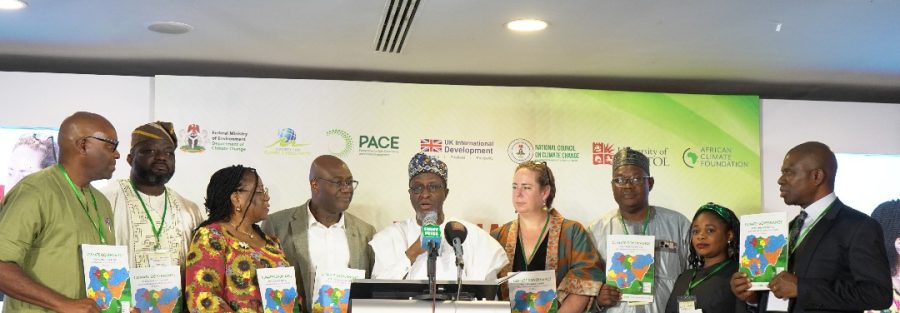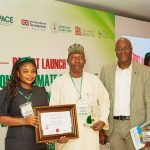For the second year in a row, Lagos State has topped the table in the annual Subnational Climate Governance Performance Rating and Ranking exercise. This was announced on Tuesday 14 October, 2025, during the launch of the second edition of the report, in Abuja.
Speaking during the unveiling of the top performing States, the Minister of Environment, Malam Balarabe Abbas Lawal said Lagos polled a total of 315 points to come first. Katsina, with 310 points, and Kaduna, with 305 points came second and third respectively.
An initiative of the Department of Climate Change, Federal Ministry of Environment, in collaboration with the Society for Planet and Prosperity (SPP), the Subnational Climate Governance Rating and Ranking project seeks to motivate subnational climate action by measuring the extent of State’s actions using five thematic areas viz: States’ Climate Institutional Arrangements; Status of Climate Policies, Action Plans, and legal frameworks at the State Level; Budgetary Allocation to Climate Change Projects; Climate Project Implementation and Monitoring; and Online Visibility and Publicity on Climate Change Issues at the State-level.
Explaining the rationale behind this, the President of the Society for Planet and Prosperity, Professor Chukwumerije Okereke stated that the five thematic areas represent critical pillars of climate action. Therefore, an interrogation of States’ efforts along those lines will spur action and provide guidance on the path States must toe.
In her speech, the Director General of the National Council on Climate Change, Barrister Tenioye Majekodunmi described the ranking as a critical milestone in Nigeria’s journey towards a robust grassroot driven climate action.
“This second ranking stands as a testament to the growing political will and commitment demonstrated by our state governments. The National Council on Climate Change as the apex regulatory body, is committed to translating the highest national ambition into local realities, and your performance is central to that mission,” she said.
This was further echoed by the First Secretary for Climate Diplomacy, UK Foreign Commonwealth and Development Office (FCDO), Samantha Harrison during her goodwill message.
“We know that subnational actors are the heartbeat of climate action. Without them, our policies remain spreadsheets on paper. Effective climate governance at the subnational level is not just beneficial, it is essential,” she said.
This year’s edition saw Kano and Enugu States breaking into the top five by making tremendous improvements from their outing last year.
Initiated in 2024, the rating and ranking project has helped create healthy competition and collaborative actions amongst States in Nigeria. Reflections from States and other stakeholders reveal that the initiative has been very impactful. Accordingly, Dr. Dahiru Muhammad Hashim, Honourable Commissioner, Ministry of Environment and Climate Change, Kano State affirms that: “Kano welcomes this platform as an opportunity to showcase progress, foster collaboration, and inspire greater ambition. The Ranking strengthens healthy competition, promotes knowledge exchange, and reinforces the urgency of addressing the climate crisis at the subnational level, where the impacts are most immediate and the solutions most impactful.”
Mr Tokunbo Wahab, Hon. Commissioner, Ministry of the Environment and Water Resources, Lagos State is of the opinion that: “For Lagos, the ranking boosts our commitment to building resilience, driving green growth, and embedding climate action into every part of our economy. We value this initiative not only for the healthy competition it encourages among states but also for the opportunities it creates for collaboration and shared progress. Lagos State remains determined to lead by example, making sure that our climate actions deliver sustainable development and a better quality of life for our people.”
Donor agencies have also seen the initiative as an important measuring board which helps provide guidance on what form of intervention States need to boost climate action. Professor Anthony Nyong, Director of Climate Change and Green Growth at the African Development Bank sees the exercise as an “innovative approach to strengthening subnational climate governance in Nigeria, fostering accountability, and catalysing green growth and climate- resilient development across the continent. It provides a valuable model for evidence-based policymaking and investment alignment to accelerate Africa’s just climate transition.”
Nigeria’s subnational remain the frontliners in the country’s efforts at addressing climate change. They are therefore critical for any meaningful impact to be made. The rating and ranking project seeks to inspire greater action.






